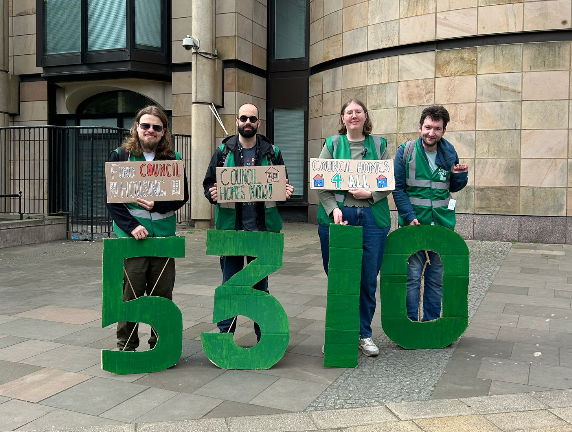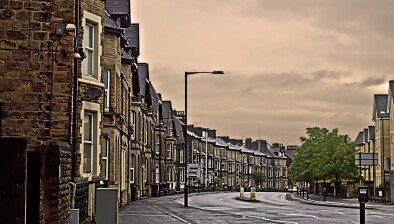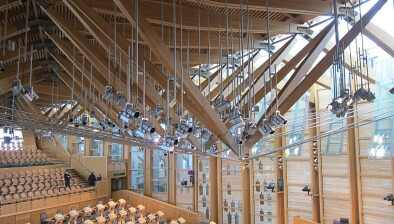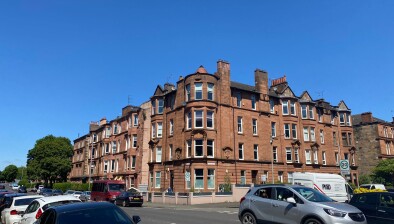Living Rent members walk in protest of Edinburgh’s temporary accommodation crisis

Members of Living Rent, Scotland’s tenants’ union, marched 2.9 miles from Dalry Road to Edinburgh City Chambers to demand that tourist tax funds be used to provide permanent council housing.
The route of the march, which represented the distance if every household in temporary accommodation were to stand in a line, followed many sites of importance, highlighting the history of tenants’ rights in the city.
The walk started at the top of Dalry Road and visited the cooperative-built Dalry Colonies, then moved to Haymarket where several hotels are used to provide temporary accommodation, stopped at Grassmarket - where Old Town saw large investments in council housing in the early 1900s, highlighting the almost £50 million spent by the City of Edinburgh Council on temporary housing, before finishing to join the May Day march City Chambers.
Living Rent said more than half of the temporary accommodation needs are currently unmet. The number of homeless people has almost doubled in the past decade, and increased by over 800 since last year, with almost 15000 people, including almost 3000 children, without a home in Edinburgh. Overall, temporary accommodation costs continue to spiral, with the council spending almost £50m in 2022, close to a 3x increase relative to 2019, the union added.
Edinburgh’s temporary accommodation crisis is just part of the wider housing emergency declared by the council in November 2023. Right now, over 23,000 people are waiting for up to 10 years for a council home, and the City of Edinburgh Council announced in April 2025 that it will be suspending all new council house leases except for a few exceptional cases.
Living Rent also pointed to new rents in the private sector in the city increasing by 18.4% over the last year, and over 104% over the last decade, which it said is pricing many out of the city they call home.
As rents and homelessness continue to rise, the crisis is completely exceeding the council’s resources, with Housing Homelessness and Fair Work Convene Councillor Lezley Marion Cameron admitting “there is a limit to what we can do with the resources available and that’s just the reality. If we had more resources we could do far more and far more quickly.”
The council formally approved plans for a 5% visitor levy on overnight accommodation earlier this year, predicted to raise upwards of £50m annually. This tax was initially proposed to feed funds back into marketing and resources for the already highly profitable tourist sector. However, a campaign demanding a “Tourist Tax for Council Flats”, initiated by Living Rent and supported by hospitality workers represented by Unite, pushed for this money to be spent on alleviating the city’s housing crisis.
Following this campaigning, the council agreed to use £5m from the visitor levy to borrow and fund £150m on housing. Living Rent said that current plans to spend this on “mid-market” rented properties will effectively deny those working in the hospitality sector, who serve Edinburgh’s tourists year round, from benefiting from the proceeds of a tax on their own sector. Increasing mid-market rents will not alleviate the city’s temporary accommodation spend or decrease the years-long waiting lists for council housing, the union said.
Thus, Living Rent is calling for the council to commit to spending a minimum of £9.1m a year to allow for borrowing of up to a minimum of £246m. This spend on permanent council accommodation could provide long term savings: council figures show that an earlier scheme to house individuals in 500 previously void properties saved over £10m in accommodation costs and obtained over £2m in rental income- savings and income that could be further increased by tourist-tax funded council housing.
Ema Nyx, council tenant and member of Living Rent Edinburgh, said: “Council housing is needed far more than any mid-market rental. It’s ridiculous that the council have deluded themselves into thinking that restricting housing into mid-market rental only for the hospitality sector will solve Edinburgh’s housing crisis.
“We were in a crisis long before it was reported on the news. My friends have been stuck in temporary accommodation for over 5 years, another friend only just got moved out of a B&B a month back into temporary accommodation. Even temporary accommodation has temporary accommodation. You need to wait in a hotel, to wait in a covered unit, to wait for a temporary flat to wait for a permanent home.
“To be honest, the council shouldn’t be concentrating on anything else because the housing situation is so dire. Accessible homes aren’t being built, repairs aren’t being done properly (my own windows are being ripped out after 4 years because they put them in wrong for the whole area). No mid-market rental exclusively for one group of workers is going to change that. The wait list for housing is getting longer and longer (it’s well past 10 years now to wait for a home). This will only get worse (and has been getting worse) the more the council neglects this in favour of wasting money on looking like they are taking action.”
LJ, hospitality worker and member of Living Rent Edinburgh, added: “As a hospitality worker for almost 4 years, and a resident (and tenant) of Edinburgh for almost 10, I have ample experience of the renting situation in the city.
“With chronically low wages and rising inflation, over 30% of my monthly earnings go to the rent alone -while for some of my colleagues their rent can be as high as 50% of their income. Coupled with appalling housing conditions, a bottleneck situation with low supply and predatory landlords, it is no surprise large numbers of my colleagues are priced out of the city, or forced into precarious housing situations - I for one had to spend almost the whole of August one year in hotel accommodation after my 10-month lease was terminated, and there are many analogous cases.
“The housing crisis, combined with precarious contracts for many hospitality workers, only aggravate residents’ (mental) health and wellbeing: I thus welcome the tourist levy and the pledge to use its resources for affordable housing, so as to implement a fair deal for us workers who keep the billion-pound tourist industry running.”







